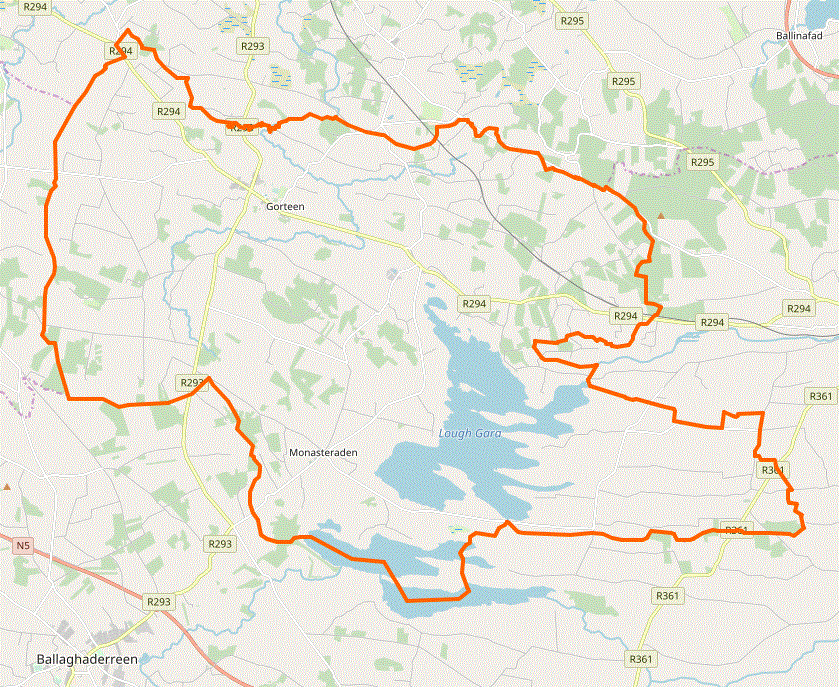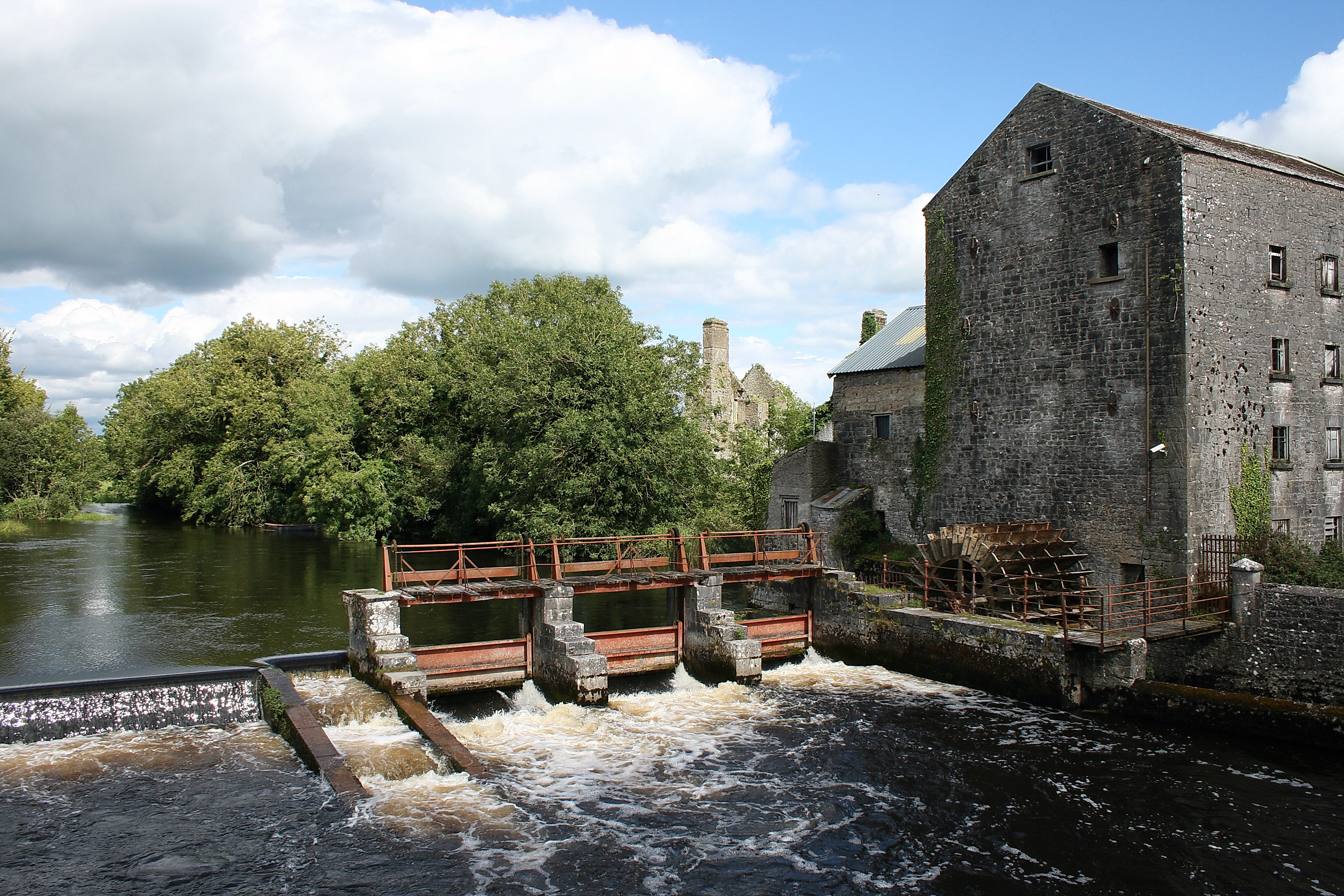|
Baron De Freyne
Baron de Freyne, of Coolavin in the County of Sligo, is a title in the Peerage of the United Kingdom. It was created in 1851 for Arthur French, 1st Baron de Freyne, with remainder to his younger brothers John, Charles and Fitzstephen French. He had earlier represented County Roscommon in the House of Commons and later served as Lord Lieutenant of County Roscommon. French had already been created Baron de Freyne, of Artagh in the County of Roscommon, in 1839, also in the Peerage of the United Kingdom but with normal remainder to heirs male. Lord de Freyne was childless and on his death in 1856 the barony of 1839 creation became extinct. The barony of 1851 creation survives according to the special remainder by his younger brother John, the second Baron. On his death, the title passed to another brother, Charles, the third Baron. In 1851 this Charles was married to Catherine Maree, daughter of Luke Maree, by a Catholic priest. Afterwards, a question arose as to the validity of the m ... [...More Info...] [...Related Items...] OR: [Wikipedia] [Google] [Baidu] |
Coolavin
Coolavin (Irish ''Cúl ó bhFionn'') is a barony in south County Sligo, Ireland. It was created from the ancient túath of An Corann. The O'Garas were originally Lords of Coolavin. They were succeeded by the MacDermotts, a family of the Milesian clans, who still claim their head to be the Prince of Coolavin Prince of Coolavin was a title first applied by popular usage to Charles MacDermot, 1707–1758, then head of the MacDermot family of Moylurg. Coolavin () is a barony in south County Sligo in Ireland. Up to the late 16th century the head of th ... to this day. References Baronies of County Sligo {{sligo-geo-stub ... [...More Info...] [...Related Items...] OR: [Wikipedia] [Google] [Baidu] |
Tulsk (Parliament Of Ireland Constituency)
Tulsk was a constituency represented in the Irish House of Commons from 1611 to 1800. Members of Parliament 1692–1801 References * {{Coord missing, County Roscommon Historic constituencies in County Roscommon Constituencies of the Parliament of Ireland (pre-1801) 1611 establishments in Ireland 1800 disestablishments in Ireland Constituencies established in 1611 Constituencies disestablished in 1800 ... [...More Info...] [...Related Items...] OR: [Wikipedia] [Google] [Baidu] |
Coa Irl Ffrench
Coa may refer to: Places * Coa, County Fermanagh, a rural community in County Fermanagh, Northern Ireland * Côa River, a tributary of the Douro, Portugal ** Battle of Coa, part of the Peninsular War period of the Napoleonic Wars ** Côa Valley Paleolithic Art, one of the biggest open air Paleolithic art sites * Quwê (or Coa), an Assyrian vassal state or province from the 9th century BC to around 627 BCE in the lowlands of eastern Cilicia ** Adana, the ancient capital of Quwê, also called Quwê or Coa * Côa (Mozambique), central Mozambique People * Eibar Coa (born 1971) Other uses * Coa de jima, or coa, a specialized tool for harvesting agave cactus * Continental Airlines, major US airline * c.o.a., coat of arms * Coa (argot) (:es:Coa (jerga), es), criminal slang used in Chile See also * COA (other) * ''Coea'', a genus of butterflies * ''Coua'', a genus of birds * Acacia koa, Koa, a species of tree {{Disambiguation, geo, surname ... [...More Info...] [...Related Items...] OR: [Wikipedia] [Google] [Baidu] |
Coronet Of A British Baron
A coronet is a small crown consisting of ornaments fixed on a metal ring. A coronet differs from other kinds of crowns in that a coronet never has arches, and from a tiara in that a coronet completely encircles the head, while a tiara does not. In other languages, this distinction is not made as usually the same word for ''crown'' is used irrespective of rank (german: Krone, nl, Kroon, sv, Krona, french: Couronne, etc.) Today, its main use is not as a headgear (indeed, many people entitled to a coronet never have a physical one created), but as a rank symbol in heraldry, adorning a coat of arms. Etymology The word stems from the Old French ''coronete'', a diminutive of ''co(u)ronne'' ('crown'), itself from the Latin ''corona'' (also 'wreath') and from the Ancient Greek ''κορώνη'' (''korōnē''; 'garland' or 'wreath'). Traditionally, such headgear is used by nobles and by princes and princesses in their coats of arms, rather than by monarchs, for whom the word ... [...More Info...] [...Related Items...] OR: [Wikipedia] [Google] [Baidu] |
Francis French, 7th Baron De Freyne
Francis Arthur John French, 7th Baron de Freyne of Coolavin, County Sligo (3 September 1927 – 24 November 2009) was an Anglo-Irish aristocrat, son of Francis French, 6th Baron de Freyne and Lina Victoria (née Arnott). He was educated at Ladycross School (Seaford, East Sussex) and at Glenstal Abbey School (County Limerick). He inherited his title in 1935, at which time, until 1999, he could vote in the House of Lords. In 1999, all but 90 or so hereditary peers were stripped of voting rights in the Lords by Tony Blair's Labour government. Lord de Freyne was a Knight of the Sovereign Military Order of Malta. In 1952, Lord de Freyne sold French Park, the family's ancestral home in Frenchpark, County Roscommon. Due to the successive Irish Land Acts, the remaining estate lands proved too small to sustain the running of the estate and the "Big House". The great house and demesne had been in the French family since were granted to Dominick French in 1666; prior to its dissemin ... [...More Info...] [...Related Items...] OR: [Wikipedia] [Google] [Baidu] |
Francis French, 6th Baron De Freyne
Francis Charles French, 6th Baron De Freyne DL (15 January 1884 – 24 December 1935) was an Anglo-Irish hereditary peer; he was a member of the House of Lords of the United Kingdom, and the Senate of Southern Ireland. He was the son of Arthur French, 4th Baron de Freyne ''of Coolavin'' and Marie Georgiana Lamb. He married Lina Victoria Arnott, daughter of Major Sir John Alexander Arnott, 2nd Bt. and Caroline Sydney Williams, on 28 February 1916. He died at his home French Park, Frenchpark on 24 December 1935 at age 51. He inherited the title Baron de Freyne in 1915. He was Deputy Lieutenant of County Roscommon and was also the High Sheriff in the County in 1912. Lord de Freyne had one son; Francis Arthur John French, 7th Baron de Freyne of Coolavin (1927–2009). Arms References External links * {{DEFAULTSORT:De Freyne, Francis 1884 births 1935 deaths 6 Francis Francis may refer to: People *Pope Francis, the head of the Catholic Church and sovereign of t ... [...More Info...] [...Related Items...] OR: [Wikipedia] [Google] [Baidu] |
Arthur French, 5th Baron De Freyne
Arthur Reginald French, 5th Baron de Freyne (3 July 1879 – 9 May 1915) was Anglo-Irish military officer of the British Army who had also served in the ranks in the United States Army. Biography He was born in London, to Arthur French of Frenchpark, County Roscommon (1855–1913), 4th Baron de Freyne, and his wife Lady Laura Octavia Dundas (died 1881). A graduate of Sandhurst, French served as a lieutenant in the Royal Fusiliers from 1899 to 1901, and then in the Reserve of Officers until 1905. He enlisted for service with the Royal Garrison Regiment, but relinquished this appointment in June 1902. In 1902, French's father cut him off financially when he married Annabelle Angus, the daughter of an innkeeper in Banffshire, Scotland, and the divorced wife of a brother officer, one Captain Alexander. The marriage was childless, though Annabelle brought a son to the marriage—Ronald True, who was convicted of murder in 1922 and spent the remainder of his life in Broadmoor ... [...More Info...] [...Related Items...] OR: [Wikipedia] [Google] [Baidu] |
Arthur French, 4th Baron De Freyne
Arthur is a common male given name of Brythonic origin. Its popularity derives from it being the name of the legendary hero King Arthur. The etymology is disputed. It may derive from the Celtic ''Artos'' meaning “Bear”. Another theory, more widely believed, is that the name is derived from the Roman clan '' Artorius'' who lived in Roman Britain for centuries. A common spelling variant used in many Slavic, Romance, and Germanic languages is Artur. In Spanish and Italian it is Arturo. Etymology The earliest datable attestation of the name Arthur is in the early 9th century Welsh-Latin text ''Historia Brittonum'', where it refers to a circa 5th to 6th-century Briton general who fought against the invading Saxons, and who later gave rise to the famous King Arthur of medieval legend and literature. A possible earlier mention of the same man is to be found in the epic Welsh poem ''Y Gododdin'' by Aneirin, which some scholars assign to the late 6th century, though this is still a mat ... [...More Info...] [...Related Items...] OR: [Wikipedia] [Google] [Baidu] |
Charles French, 3rd Baron De Freyne
Charles is a masculine given name predominantly found in English and French speaking countries. It is from the French form ''Charles'' of the Proto-Germanic name (in runic alphabet) or ''*karilaz'' (in Latin alphabet), whose meaning was "free man". The Old English descendant of this word was '' Ċearl'' or ''Ċeorl'', as the name of King Cearl of Mercia, that disappeared after the Norman conquest of England. The name was notably borne by Charlemagne (Charles the Great), and was at the time Latinized as ''Karolus'' (as in ''Vita Karoli Magni''), later also as '' Carolus''. Some Germanic languages, for example Dutch and German, have retained the word in two separate senses. In the particular case of Dutch, ''Karel'' refers to the given name, whereas the noun ''kerel'' means "a bloke, fellow, man". Etymology The name's etymology is a Common Germanic noun ''*karilaz'' meaning "free man", which survives in English as churl (< Old English ''ċeorl''), which developed its depre ... [...More Info...] [...Related Items...] OR: [Wikipedia] [Google] [Baidu] |
John French, 2nd Baron De Freyne
John is a common English name and surname: * John (given name) * John (surname) John may also refer to: New Testament Works * Gospel of John, a title often shortened to John * First Epistle of John, often shortened to 1 John * Second Epistle of John, often shortened to 2 John * Third Epistle of John, often shortened to 3 John People * John the Baptist (died c. AD 30), regarded as a prophet and the forerunner of Jesus Christ * John the Apostle (lived c. AD 30), one of the twelve apostles of Jesus * John the Evangelist, assigned author of the Fourth Gospel, once identified with the Apostle * John of Patmos, also known as John the Divine or John the Revelator, the author of the Book of Revelation, once identified with the Apostle * John the Presbyter, a figure either identified with or distinguished from the Apostle, the Evangelist and John of Patmos Other people with the given name Religious figures * John, father of Andrew the Apostle and Saint Peter * Pope John ... [...More Info...] [...Related Items...] OR: [Wikipedia] [Google] [Baidu] |
County Roscommon
"Steadfast Irish heart" , image_map = Island of Ireland location map Roscommon.svg , subdivision_type = Country , subdivision_name = Ireland , subdivision_type1 = Province , subdivision_name1 = Connacht , subdivision_type2 = Regions of Ireland, Region , subdivision_name2 = Northern and Western Region, Northern and Western , seat_type = County town , seat = Roscommon , leader_title = Local government in the Republic of Ireland, Local authority , leader_name = Roscommon County Council, County Council , leader_title2 = Dáil constituencies , leader_title3 = European Parliament constituencies in the Republic of Ireland, EP constituency , leader_name2 = Roscommon–Galway (Dáil constituency), Roscommon–Galway Sligo–Leitrim (Dáil constituency), Sligo–Leitrim , leader_name3 = Midlands–North-West (European Parliament constituency), Midlands–North-West , ... [...More Info...] [...Related Items...] OR: [Wikipedia] [Google] [Baidu] |



